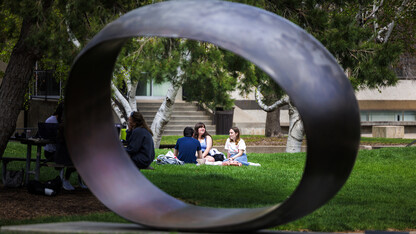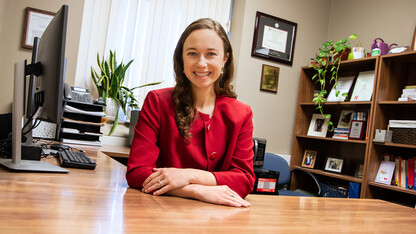· 6 min read
Trio to share honor of 100th doctorate to woman in mathematics

Fifty-eight years after the first woman earned a doctorate in mathematics at the University of Nebraska–Lincoln, the honor of the 100th will be shared by three women graduating in May 2021.
Juliana Bukoski, Elizabeth Carlson and Su Ji Hong will bring the number of women who have earned a doctorate from the Nebraska mathematics department to the century mark. Prior to the 21st century, only 50 doctorates in mathematics had been earned by Huskers who are women.
Taran Funk and Robert Huben join Bukoski, Carlson and Hong as May 2021 doctorate recipients from mathematics.
Mildred Gross was the university's first woman to earn a math doctorate in 1963. The department did not award its 10th degree to a woman until 1995 when Ferhan Atici, Nancy Campbell, Betty Harmsen and Kristin Pfabe graduated.
To date, the department has awarded 342 doctorates. The 100th was awarded in 1986, the 200th in 2008, and the 300th in 2017. After no women earned the distinction in mathematics in the 1980s, 18 were earned by women in the 1990s, 26 in the 2000s, 45 in the 2010s, and five thus far in the 2020s.
Nationally, only about 26% of new doctorates are earned by women, and this milestone continues the department’s reputation as being a place where women graduate students are successful. Women earned 40% of Nebraska mathematics Ph.Ds. in the 2010s.
Read on to learn more about 2021 graduates Bukoski, Carlson and Hong. The names of this year's graduates and award recipients are on the department's [recognition website](https://math.unl.edu/math-recognition).
#### Juliana Bukoski
Advised by Allan Donsig, professor of mathematics, Bukoski’s area of study is operator algebras, and her dissertation topic was free semigroupoid algebras from categories of paths.
Born and raised in Johnstown, Pennsylvania, Bukoski received her bachelor’s degree in 2014 from Colgate University, double majoring in mathematics and French. A professor at Colgate recommended that she apply to Nebraska because of its reputation as having a friendly mathematics department, and Bukoski agreed with that assessment when she came to visit.
Bukoski also participated in the nationally known Enhancing Diversity in Graduate Education program for women entering graduate school, which introduced her to many other women in mathematics.
“When I think back about my interactions with the math department over the years, my main impression is how clearly the graduate students here are valued, from the pedagogy class and other teaching mentorships, to each semester’s Q&A with the chair or vice chair, to the lunches with visiting candidates,” Bukoski said. “We are really treated as an important part of the department.”
After graduation, Bukoski will become an assistant professor of mathematics at Georgetown College in Kentucky. Her favorite math courses to teach at Nebraska were trigonometry and linear algebra.
“I feel proud to be part of a program that has been so successful in helping women to succeed, and also honored to be one of the women recognized at this milestone. Each woman who succeeds makes it a little easier for the next, so I am grateful to all those who came before me,” Bukoski said.
#### Elizabeth Carlson
Carlson’s undergraduate adviser at Carroll College, Eric Sullivan, met Carlson’s eventual graduate adviser Adam Larios at a conference, when they were both graduate students. Knowing Larios’s research, Sullivan encouraged Carlson to apply to Nebraska. After Carlson met Larios during her graduate school visit, the deal was sealed, she said.
“My adviser was fantastic to work with,” Carlson said. “Dr. Larios has so much energy, so many ideas. He pushed me to do my best.”
Carlson was a National Science Foundation Graduate Research Fellow during her time at Nebraska. She also prepared students for several math modeling competitions and graded for those contests.
“I really appreciated when professors in the department supported my efforts to restart undergrad math modeling competitions,” Carlson said. “They really stepped up to run preparatory sessions for the undergrads when I didn’t have the time. Without their support, that unique part of my graduate journey wouldn’t have been possible.”
Carlson will soon begin a PIMS Postdoctoral Fellowship at the University of Victoria, Canada, under the mentorship of David Goluskin.
“My grandfather says he remembers me telling him when I was 15 that I was going to get my Ph.D. in mathematics,” said Carlson, whose favorite courses as a student at the university were measure theory and functional analysis.
Raised in Helena, Montana, Carlson received a Bachelor of Arts in mathematics and a minor in physics in 2016 at Carroll College.
“My goals currently are to continue to work at the intersection of pure and applied mathematics, using the tools of each to further the understanding of both in ways that could not be done by studying the individual fields alone,” Carlson said.
#### Su Ji Hong
Hong studied algebraic combinatorics and was co-advised by Kyungyong Lee, who is now at the University of Alabama, and Tri Lai, assistant professor. Her dissertation was on diagrammatic description of real Schur roots.
Lee, who continued to advise Hong’s research after he moved to Alabama, asked Lai to co-advise Hong, to continue meeting her research interests.
“I cannot thank Kyungyong enough for always looking out for me,” Hong said.
Hong received her bachelor’s degree from California Lutheran University in 2015, double majoring in mathematics and physics. At Nebraska, she enjoyed a discrete mathematics class with Jamie Radcliffe, professor, the most, as it was her first time learning about combinatorics in-depth.
An alumna from California Lutheran was a mathematics graduate student at Nebraska when Hong was applying to graduate schools.
“She encouraged me to attend the Nebraska Conference for Undergraduate Women in Mathematics, and told me how supportive the UNL math department is,” Hong said. “I applied and after attending NCUWM, I was set on coming to Nebraska if I got accepted.”
After graduating, Hong will be working at Yale University for three years as a lecturer, teaching mostly calculus courses. She hopes to earn a tenure-track position at a liberal arts college in the future and attend NCUWM with her own students.
“I have been a participant, invited panelist, and an organizer of NCUWM, so it would be great to participate as a faculty,” Hong said.
Hong was born on Jeju, a South Korea island. She grew up on Jeju until her family moved to Ventura, California, when she was 13.
While Hong said she has encountered some gender-based bias and some racial bias, she has never felt discouraged by any of those interactions since she could talk it out with her friends in the math community.
“I’m sure it was extremely difficult for the first woman to receive a Ph.D. from UNL and survive in that community. But, I’m the 100th woman, and I never felt out of place in the math community,” Hong said.







